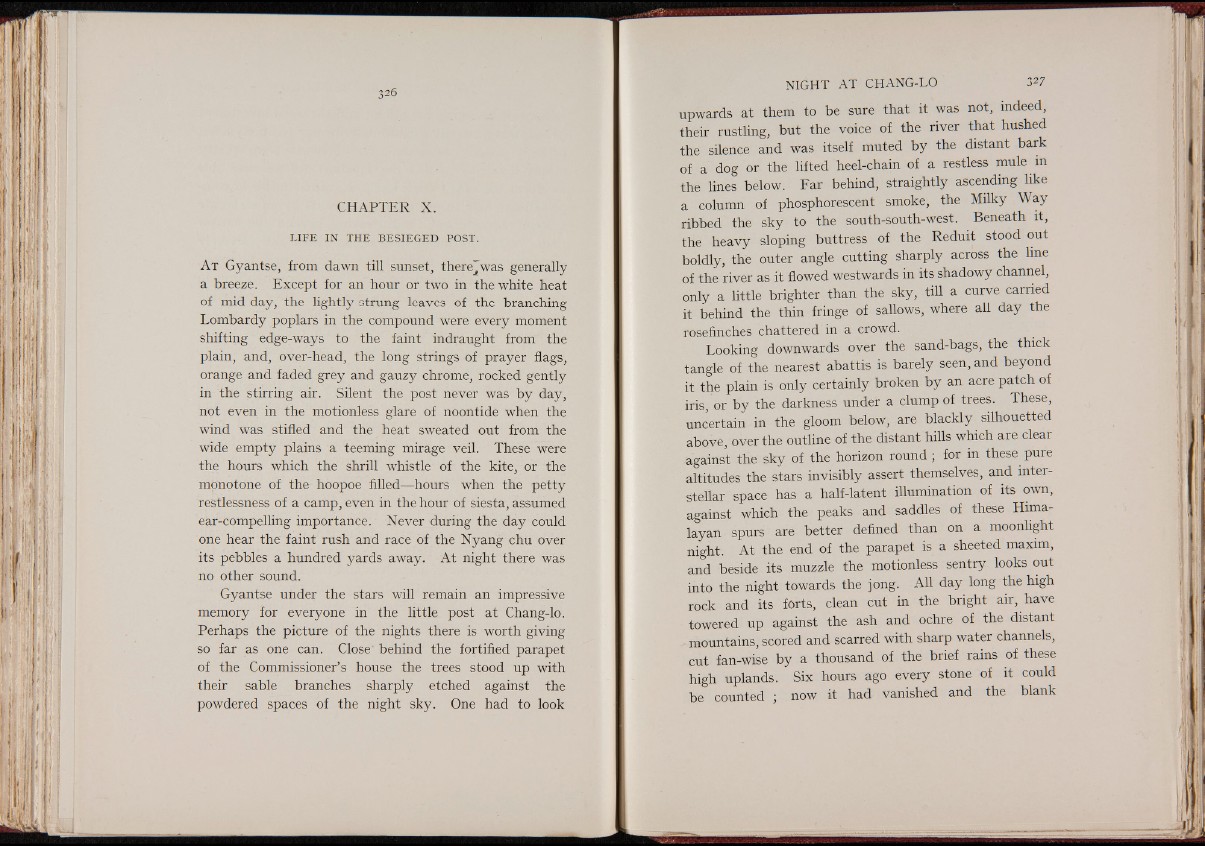
CHAPTER X.
LIFE IN THE BESIEGED POST.
A t Gyantse, from dawn till sunset, there~was generally
a breeze. Except for an hour or two in the white heat
of mid-day, the lightly-strung leaves of the branching
Lombardy poplars in the compound were every moment
shifting edge-ways to the faint indraught from the
plain, and, over-head, the long strings of prayer flags,
orange and faded grey and gauzy chrome, rocked gently
in the stirring air. Silent the post never was by day,
not even in the motionless glare of noontide when the
wind was stifled and the heat sweated out from the
wide empty plains a teeming mirage veil. These were
the hours which the shrill whistle of the kite, or the
monotone of the hoopoe filled— hours when the petty
restlessness of a camp, even in the hour of siesta, assumed
ear-compelling importance. Never during the day could
one hear the faint rush and race of the Nyang chu over
its pebbles a hundred yards away. At night there was
no other sound.
Gyantse under the stars will remain an impressive
memory for everyone in the little post at Chang-lo.
Perhaps the picture of the nights there is worth giving
so far as one can. Close' behind the fortified parapet
of the Commissioner’s house the trees stood up with
their sable branches sharply etched against the
powdered spaces of the night sky. One had to look
upwards at them to be sure that it was not, indeed,
their rustling, but the voice of the river that hushed
the silence and was itself muted by the distant bark
of a dog or the lifted heel-chain of a restless mule in
the lines below. Far behind, straightly ascending like
a column of phosphorescent smoke, the Milky Way
ribbed the sky to the south-south-west. Beneath it,
the heavy sloping buttress of the Reduit stood out
boldly, the outer angle cutting sharply across the line
of the river as it flowed westwards in its shadowy channel,
only a little brighter than the sky, till a curve earned
it behind the thin fringe of sallows, where all day the
rosefinches chattered in a crowd.
Looking downwards over the sand-bags, the thick
tangle of the nearest abattis is barely seen, and beyond
it the plain is only certainly broken by an acre patch of
iris, or by the darkness under a clump of trees. These,
uncertain in the gloom below, are blackly silhouetted
above, over the outline of the distant hills which are clear
against the sky of the horizon round; for in these pure
altitudes the stars invisibly assert themselves, and interstellar
space has a half-latent illumination of its own,
against which the peaks and saddles of these Himalayan
spurs are better defined than on a moonlight
night. At the end of the parapet is a sheeted maxim,
and beside its muzzle the motionless sentry looks out
into the night towards the jong. All day long the high
rock and its forts, clean cut in the bright air, have
towered up against the ash and ochre of the distant
mountains, scored and scarred with sharp water channels,
cut fan-wise by a thousand of the brief rains of these
high uplands. Six hours ago every stone of it could
be counted ; now it had vanished and the blank